
A successful arms dealer, Francis Arthur Nzeribe sold weapons to both Nigeria and Biafra during the 30-month Nigerian Civil War. As a matter of fact, Nzeribe traded arms in every single place there has been a conflict in Africa. 

In the 1960s, Nzeribe worked for Kwame Nkrumah as a speechwriter but after the coup that sent Nkrumah and his aides to Conakry, Nzeribe sneaked back to Ghana to work for the new government that had overthrown his principal.
In April 1969, Nzeribe was involved in a bribery scandal with Ghana's Head-of-State, Joseph Arthur Ankrah which forced the latter to resign. In 1979, J.J Rawlings deported the Nigerian businessman from Ghana where he found his way to the UK to continue his arms-dealing business.
In 1970, after the civil war, Nzeribe returned to Nigeria to open his first company, FANS Holdings Limited.
In 1993, Nzeribe's Association for Better Nigeria approached the court on the basis of corruption and rigging to stop the announcement of the June 12, 1993, election results, which ultimately led to the annulment of the election.
In May 2000, now a Senator in Nigeria's Fourth Republic, Arthur Nzeribe asked the National Assembly to impeach President Olusegun Obasanjo based on the non-resolution of the Sharia law controversy, stating that it was to the detriment of Muslims.
Most Igbo people, Nzeribe's kinsmen, were flabbergasted as most victims of the carnage in Kaduna between February 21 and 23, 2000, over the proposed adoption of the Muslim legal regime were Eastern Nigerians while the perpetrators were Islamic fanatics. #HistoryVille
• • •
Missing some Tweet in this thread? You can try to
force a refresh









